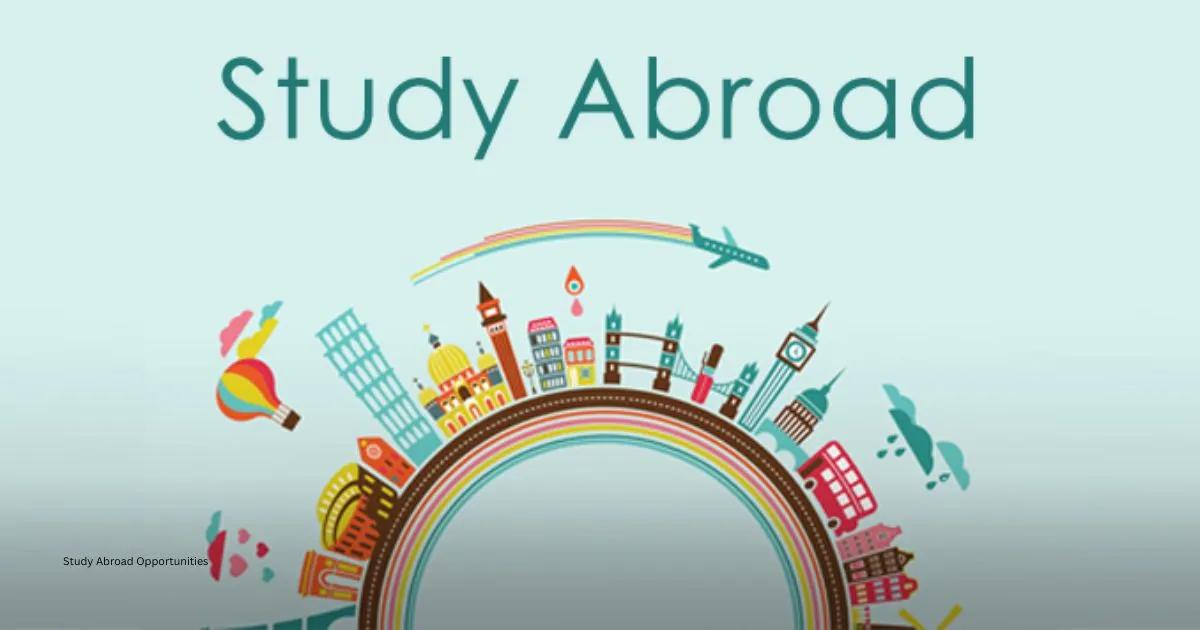Study Abroad Opportunities in 2025: Your Complete Guide to Studying Overseas

If you’re looking for study abroad opportunities, you’re in the right place. This article gives you everything you need to get started—from where to go and what to study, to how to get scholarships and make the most of your international education experience.
Studying abroad can open doors to world-class education, cultural exchange, global networking, and exciting career paths. Whether you dream of studying in the USA, Canada, UK, Germany, Australia, or beyond, the process can feel overwhelming at first. But don’t worry—we’ve simplified it all for you.
In this detailed guide, you’ll discover the best countries to study abroad, programs in demand, scholarship options, eligibility requirements, and even tips on choosing the right university and adjusting to life abroad. Your journey to international education starts now—let’s dive in!
Table of Contents
Top Countries Offering Study Abroad Opportunities
1. United States
The USA remains one of the top destinations for international students due to its diverse programs and prestigious universities like Harvard, MIT, and Stanford. The U.S. offers flexibility in course selection, access to research, and a multicultural environment.
2. Canada
Canada is known for its quality education system, student-friendly visa policies, and welcoming culture. Universities like the University of Toronto, McGill, and UBC are globally ranked.
3. United Kingdom
UK institutions like Oxford, Cambridge, and Imperial College London are globally respected. With 1-year master’s programs and a 2-year post-study work visa, the UK is increasingly popular among international students.
4. Australia
Australia offers high-quality education, stunning landscapes, and a high standard of living. Institutions such as the University of Melbourne and ANU attract students from all over the world.
5. Germany
Germany is a hub for STEM and business programs, with many public universities offering tuition-free education. You only need to cover living costs, making it one of the most affordable options.
Popular Programs to Study Abroad
Undergraduate and Postgraduate Programs
Most countries offer a variety of degrees including:
- Business and Management
- Engineering and Technology
- Health and Life Sciences
- Computer Science
- Arts and Humanities
- Social Sciences
Short-Term Programs
Some students choose:
- Summer schools
- Exchange semesters
- Internships abroad
- Language immersion programs
These are ideal for gaining international exposure without committing to a full degree.
Scholarships for Study Abroad
Worried about tuition fees? Here are major scholarships for international students:
Government Scholarships
- Fulbright (USA)
- Chevening (UK)
- DAAD (Germany)
- Vanier Scholarships (Canada)
- Australia Awards
University-Based Scholarships
Most top universities offer partial to full scholarships for academic excellence, financial need, or extracurricular achievements.
Private & NGO Scholarships
Organizations like the Rotary Foundation and the Gates Foundation also fund global education opportunities.
Eligibility Requirements
To apply for study abroad opportunities, you’ll typically need:
- Academic transcripts
- Language proficiency test scores (IELTS/TOEFL)
- Statement of Purpose (SOP)
- Letters of Recommendation (LOR)
- Passport and visa documents
Always check the official university or government website for country-specific requirements.
How to Apply for Study Abroad Programs
- Research destinations and courses
Use platforms like QS Rankings, Times Higher Education, or university websites. - Prepare for standardized tests
GRE, GMAT, SAT, or language exams like IELTS/TOEFL as required. - Write SOP & gather documents
These documents are critical for both admission and visa. - Apply to multiple universities
Don’t put all your eggs in one basket. Apply to safety, target, and dream schools. - Apply for scholarships
Look early and apply before deadlines. - Apply for student visa
After admission, start the visa application process immediately.
How to Choose the Right University Abroad
- Rankings & Reputation: Pick institutions that are recognized globally or within your field.
- Program Fit: Check course modules, faculty, internship options.
- Cost & Financial Aid: Tuition + living cost + scholarships = affordability.
- Location: Think climate, culture, and post-study work options.
- Student Support Services: Look for career counseling, student housing, and alumni networks.
Benefits of Studying Abroad
- Global Exposure
Learn how different cultures work, study, and live. - Language Skills
Improve your English or learn a new language by immersing yourself. - Career Boost
Employers value international experience—it shows adaptability and initiative. - Networking Opportunities
Build connections worldwide that may help in future job markets. - Personal Growth
Gain confidence, independence, and life-long memories.
Living Abroad: Tips for a Smooth Transition
- Join student forums and expat groups
- Understand local laws and customs
- Learn basic language phrases
- Keep digital copies of documents
- Budget your expenses wisely
- Stay in touch with family
Study Abroad Opportunities After Graduation
Many students continue to explore opportunities like:
- Postgraduate degrees
- Work permits and immigration
- Research assistantships
- Ph.D. programs
- Global fellowships
Explore options to extend your stay and gain international work experience after your studies.
Hybrid and Online Study Abroad Options
Some students choose:
- Virtual exchange programs
- Hybrid degrees (part online, part on-campus)
- Global classrooms with partner institutions
This is a budget-friendly way to access international education without relocating full-time.
Study Abroad Trends in 2025
- AI-powered application platforms
- Rise of non-traditional destinations (South Korea, Netherlands, UAE)
- Sustainability-focused study programs
- Increased focus on mental health and student well-being
- Easier visa and immigration policies post-pandemic
Conclusion: (Study Abroad Opportunities)
Study abroad opportunities in 2025 have never been more accessible or exciting. Whether you’re aiming for a full degree, a short exchange program, or a funded scholarship, now is the perfect time to take the leap. With careful planning, research, and support, you can study in a country of your dreams, grow as a person, and open doors to a world of possibilities. Don’t wait—start planning your global academic journey today.
FAQs: (Study Abroad Opportunities)
What is the cheapest country to study abroad?
Germany and Norway offer low or no tuition fees for international students.
How can I get a scholarship to study abroad?
Research government, university, and private scholarships. Apply early with a strong SOP and academic profile.
Do I need IELTS for studying abroad?
Most English-speaking countries require IELTS or TOEFL. Some waive it if your previous education was in English.
Can I work while studying abroad?
Yes, most countries allow part-time work (10–20 hours/week) on a student visa.
What is the best time to apply for study abroad programs?
Start 8–12 months in advance. Major intakes are usually in Fall (August/September) and Spring (January/February).






